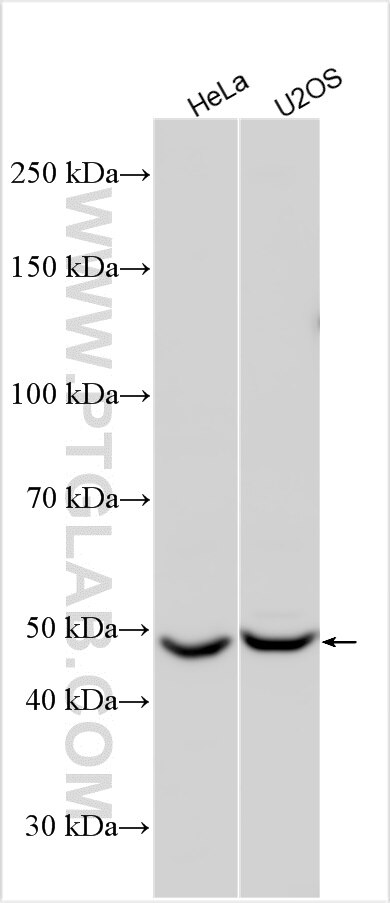Tested Applications
| Positive WB detected in | HeLa cells, U2OS cells |
Recommended dilution
| Application | Dilution |
|---|---|
| Western Blot (WB) | WB : 1:2000-1:10000 |
| It is recommended that this reagent should be titrated in each testing system to obtain optimal results. | |
| Sample-dependent, Check data in validation data gallery. | |
Published Applications
| WB | See 1 publications below |
Product Information
24707-1-AP targets TTYH3 in WB, ELISA applications and shows reactivity with human samples.
| Tested Reactivity | human |
| Cited Reactivity | human |
| Host / Isotype | Rabbit / IgG |
| Class | Polyclonal |
| Type | Antibody |
| Immunogen |
CatNo: Ag18804 Product name: Recombinant human TTYH3 protein Source: e coli.-derived, PGEX-4T Tag: GST Domain: 259-386 aa of BC131824 Sequence: LELAVSVGSSDFCVDPDAYVTKMVEEYSVLSGDILQYYLACSPRAANPFQQKLSGSHKALVEMQDVVAELLRTVPWEQPATKDPLLRVQEVLNGTEVNLQHLTALVDCRSLHLDYVQALTGFCYDGVE Predict reactive species |
| Full Name | tweety homolog 3 (Drosophila) |
| Calculated Molecular Weight | 523 aa, 58 kDa |
| Observed Molecular Weight | 50 kDa |
| GenBank Accession Number | BC131824 |
| Gene Symbol | TTYH3 |
| Gene ID (NCBI) | 80727 |
| RRID | AB_3085749 |
| Conjugate | Unconjugated |
| Form | Liquid |
| Purification Method | Antigen affinity purification |
| UNIPROT ID | Q9C0H2 |
| Storage Buffer | PBS with 0.02% sodium azide and 50% glycerol, pH 7.3. |
| Storage Conditions | Store at -20°C. Stable for one year after shipment. Aliquoting is unnecessary for -20oC storage. 20ul sizes contain 0.1% BSA. |
Background Information
Tweety homologs (TTYHs) are conserved transmembrane proteins present in all eukaryotes including three members (TTYH1, TTYH2, and TTYH3) in humans. They are widely expressed in mammals including at high levels in the nervous system and have been implicated in cancers and other diseases including epilepsy, chronic pain, and viral infections. Physiologically, TTYH2 and TTYH3 are broadly expressed, while expression of TTYH1 is primarily limited to the nervous system, testes, and stem cells. TTYH3 is upregulated in gastric cancer with higher expression correlated with poor clinical outcomes. (PMID: 34824283)
Protocols
| Product Specific Protocols | |
|---|---|
| WB protocol for TTYH3 antibody 24707-1-AP | Download protocol |
| Standard Protocols | |
|---|---|
| Click here to view our Standard Protocols |




